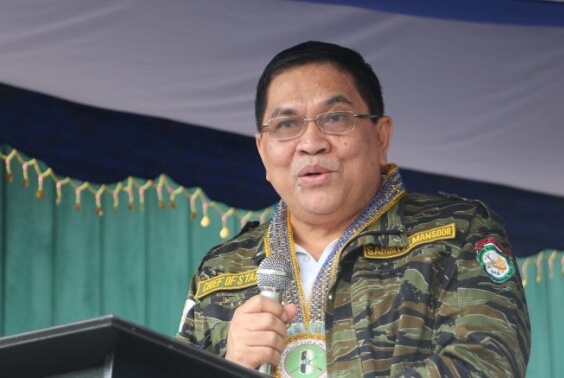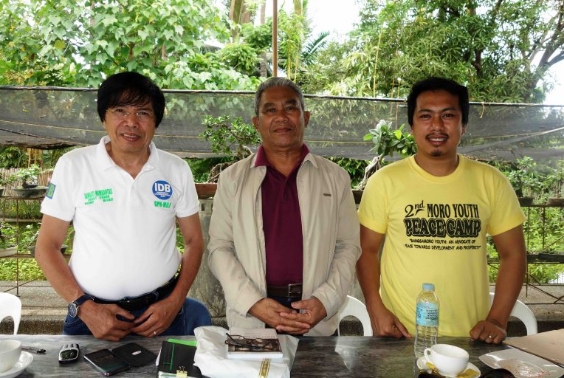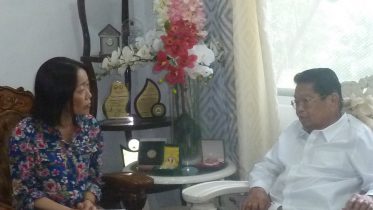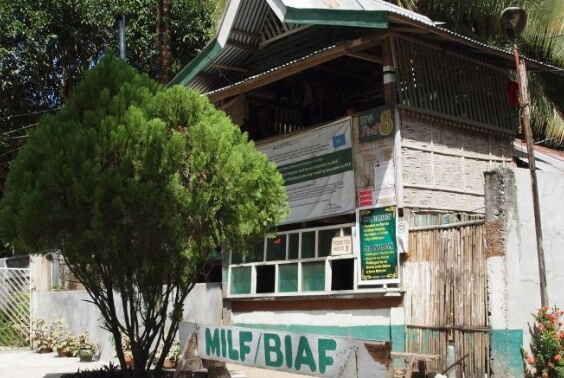- SOUTHERN PHILIPPINES
The Challenges Faced by the Bangsamoro Transition Commission in Drafting the New Bangsamoro Basic Law
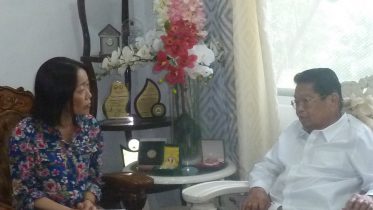
Interview with Chairman Ghazali Jaafar, Chairman of the expanded Bangsamoro Transition Commission
Sultan Kudarat Municipality, Maguindanao Province, September 9, 2017
By Masako Ishii, Professor, Rikkyo University
On February 24, 2017, the renewed Bangsamoro Transition Commission was launched to draft the new Bangsamoro Basic Law (BBL), with the intention of establishing an Autonomous Government and replacing the current Autonomous Region in Muslim Mindanao. The BTC completed the task of drafting the BBL on June 16, 2017, and has submitted it to President Duterte on July 17. However, no major progress has yet been seen as of September 9, 2017.
Q
What was the most challenging aspect of drafting the new BBL?
Chairman Ghazali Jaafar
The most challenging thing we experienced in drafting the BBL was, firstly, encountering a diverse range of opinions, which is due to the composition of the Bangsamoro Transition Commission (BTC).
Eleven members of the BTC came from the MILF (Moro Islamic Liberation Front). Of the 11, 7 were members of the MILF Central Committee but 4 were not, although they had been recommended by the MILF.
The Government had 10 commissioners. Commissioner Jose Lorena had been working in Malacañan for many years. Commissioner Atty Hussin Amin was a former Congressman and Mayor of Jolo. They were experienced debaters.
In other words, the 10 commissioners from the Government’s side came from different sectors. This was one of the challenges because they had varied opinions.
As Chairman of the BTC, it was not easy for me to handle such brilliant commissioners. I think they were more brilliant and brighter than me. So, at the start, I was tempted to debate with them and exercise my full authority as Chairman of the BTC; but, I did not do that. I decided that it would be better to first see how they worked as commissioners, and I allowed them to debate in the plenary session.
Q
I see. You first observed the manner in which they discussed.
Chairman Ghazali Jaafar
Yes. And finally, I found out that the best way for me to handle them was to deal with them as “brothers.”
Q
I see.
Chairman Ghazali Jaafar
After all, we came from different groups and we had different backgrounds—my background is of a guerrilla fighter, and I think they did not relate to my experience as a guerrilla fighter. So, I treated them as “brothers.” In the beginning, I told them that, as Chairman of the BTC, my responsibility is to give guidance to the BTC as mandated by the President. And, I appealed to them to work together and to co-operate with one another.
We are going to establish a government, not of the MNLF (Moro National Liberation Front) or the MILF, but a government of the people. I appealed to them to come together to work for the interest of our people. Whenever they wanted to debate and discuss, I allowed them to do so. But, when it came to a point when I had to come in, then I intervened.
The Issue of Territory
Q
There were 5 standing committees in the BTC[1]. Which issue was the most difficult to deal with?
Chairman Ghazali Jaafar
All of them.
Q
What about the debate on the “Core Territory”? I suppose that the MNLF commissioners have debated so that it will cover the 13 provinces and 9 cities that had been promised to establish the Autonomous Government according to the 1976 Tripoli agreement.
Chairman Ghazali Jaafar
No, not so much. First, in the beginning, we agreed in the BTC that the previous BBL would be adopted as a working paper.
Second, we agreed, with regard to the proposed BBL, that what we were going to write would be compliant to the Comprehensive Agreement on the Bangsamoro.
Third, we agreed that if there was a need to amend any provisions of the BBL, we would make the amendments provided the intention to amend the provisions was to enhance or improve the provisions.
But, in fairness to our brothers of the MNLF, we considered their proposal to include their provision of the BBL.
The MNLF brothers presented a provision that those areas occupied by the Moro outside of Core Territory could also be included in the Bangsamoro by way of plebiscite.
They presented a proposal called “opt-in,” meaning opting in. Those Moros residing outside the Core Territory can file a petition to be included in the Bangsamoro Government. Five years after the ratification of this Basic Law and every five years thereafter for a period of 25 years, a plebiscite shall be held in the cities, municipalities, and other geographic areas that were not able to join the Bangsamoro to determine whether or not they desire to join the Bangsamoro.
The Issues of Indigenous Peoples
Q
What about the issues of Indigenous Peoples (IPs)? With the previous BBL, IPs have mainly requested the inclusion of 3 points: (1) their distinct identity, (2) their distinct Ancestral Domain, and (3) IPRA (Indigenous Peoples’ Rights Act). However, they were not reflected in the new BBL. How were they debated?
Chairman Ghazali Jaafar
They were debated first in the committee level meeting. During the course of our session, sometimes leaders of IPs presented some proposals, and we dealt with them directly. Those proposals were accommodated in the provisions of the BBL as much as possible. However, not all concerns were agreed upon between us. Therefore, we will discuss them again on Sept 18, 2017, in Davao at the forum.
Q
What is the reason why the BBL cannot include the IPRA?
Chairman Ghazali Jaafar
We believe that it is not necessary for the IPRA to be included in the provisions of the BBL because the BBL covers many of the IPRA’s rights.
Q
But, even though you’ve been explaining to IPs that the BBL can assure more rights than the IPRA, they still demand it, don’t they? What do you think is the reason why they continuously demand it?
Chairman Ghazali Jaafar
I think they have an organization that insists on IPRA being included in the BBL.
Q
What about the issue of the IPs’ identity? Some of the IPs would like to be recognized as having a distinct identity. But, according to the definition of the BBL, there is only one Bangsamoro identity, although the freedom of choice of other IPs shall be respected.
Chairman Ghazali Jaafar
No problem. We can tolerate that they have their identity.
Q
Since you have submitted the BBL on July 17, 2017, to the President, I have not heard good news about its progress. First, the State of the Nation Address (SONA) made no call on immediate passage of the BBL. Second, no lawmaker has sponsored the BBL yet. Third, the BBL was not on the list of priority bills, in other words, not among 28 bills listed under the Common Legislative Agenda approved by the Legislative-Executive Development Advisory Council (LEDAC). How did the discussion progress when you met with the President on September 4, 2017?
Chairman Ghazali Jaafar
Our brothers in the field, supporters, and legitimate members are apprehensive about the situation. The media also ask about the reason why, but we cannot give them speculative answers. Therefore, we have decided to request a meeting with the President.
Q
So, it was your side that requested a meeting with the President.
Chairman Ghazali Jaafar
Yes, and we appreciated the fact that the President immediately approved our request. The President explained to us that the fact that the BBL was not yet moving in Congress does not mean that he has forgotten his commitment to us and to the people of Mindanao. He said that he was thinking of certain Congressmen to sponsor the bill. Moreover, we will be meeting again with the President in the presence of Senate President Aquilino Pimentel III and House Speaker Pantaleon Alvarez to discuss this matter on September 14, 2017.
The Issue of the Rise of Radical Groups
Q
My last question is about the Marawi siege. The presence of the radical group has become a new concern for MILF. How are you going to deal with this new concern?
Chairman Ghazali Jaafar
In a struggle and a revolution like ours, the prevailing rule is to have dialogue with the brothers and probably to convince them to stop. They have one interest, like us. Their interest is to establish the Bangsamoro Government, which also happens to be our interest.
Q
But they want to establish an Islamic State, the idea of which would negate the nation-state of the Philippines.
Chairman Ghazali Jaafar
That’s according to them. But, with regard to this claim, we have yet to prove how authentic that vision is. There is a possibility that they might have used this to convince the ISIS to give them more outside support and logistics.
Masako Ishii: Thank you very much.
Chairman Ghazali Jaafar
Thank you very much.
END
[1] These are (1) Fiscal Autonomy, (2) Political Autonomy, (3) Basic Rights, (4) Transitory, and (5) Justice and Security.





